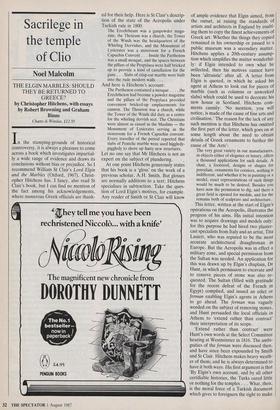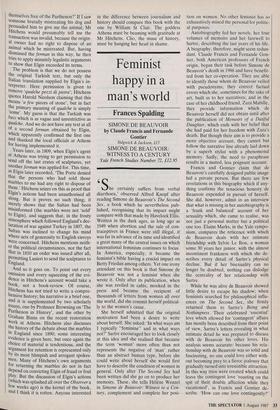Sacrilege in the temple of Clio
Noel Malcolm
THE ELGIN MARBLES: SHOULD THEY BE RETURNED TO GREECE? by Christopher Hitchens, with essays by Robert Browning and Graham Binns
Chatto & Windus, £12.95
In the stamping-grounds of historical controversy, it is always a pleasure to come across a book which investigates impartial- ly a wide range of evidence and draws its conclusions without bias or prejudice. So I recommend William St Clair's Lord Elgin and the Marbles (Oxford, 1967). Christ- opher Hitchens has, I fancy, also read St Clair's book, but I can find no mention of the fact among his acknowledgements, where numerous Greek officials are thank- ed for their help. Here is St Clair's descrip- tion of the state of the Acropolis under Turkish rule in 1800:
The Erechtheum was a gunpowder maga- zine, the Theseum was a church, the Tower of the Winds was the headquarters of the Whirling Dervishes, and the Monument of Lysicrates was a storeroom for a French Capuchin Convent . . . Inside the Parthenon was a small mosque, and the spaces between the pillars of the Propylaea were half bricked up to provide a kind of castellation for the guns . . . Slabs of crisp-cut marble were built into the rude modern walls . . .
And here is Hitchens's account:
The Parthenon contained a mosque . . . , the Erechtheion had become a powder magazine and the pillars of the Propylaea provided convenient bricked-up emplacements for cannon. The Theseion was a church, while the Tower of the Winds did duty as a centre for the whirling dervish sect. The Christians were almost as casual as the Muslims — the Monument of Lysicrates serving as the storeroom for a French Capuchin convent. Every traveller of the period reported that slabs of Pentelic marble were used higgledy- piggledy to shore up hasty new structures.
Let no one say that Mr Hitchens is not an expert on the subject of plundering.
At one point Hitchens generously states that his book is a 'gloss' on the work of a previous scholar, A.H. Smith. But glosses are normally additions to a text; Hitchens specialises in subtraction. Take the ques- tion of Lord Elgin's motives, for example. Any reader of Smith or St Clair will know of ample evidence that Elgin aimed, from the outset, at raising the standards of artists and architects in England by enabl- ing them to copy the finest achievements of Greek art. Whether the things they copied remained in his ownership or passed to a public museum was a secondary matter. Hitchens applies a 20th-century assump- tion which simplifies the matter wonderful- ly: if Elgin intended to own what he collected, then his motives cannot have been 'altruistic' after all. A letter from Elgin is quoted, in which he asked his agent at Athens to look out for pieces of marble (such as columns or unworked slabs) which could be used to decorate his new house in Scotland. Hitchens com- ments cannily: 'No mention, you will notice, is made of the cause of fine arts and civilisation.' The reason for the lack of any such mention is that Hitchens has omitted the first part of the letter, which goes on at some length about the need to obtain details of Greek ornaments to further the cause of 'the Arts':
The very great variety in our manufactures, in objects either of elegance or luxury, offers a thousand applications for such details. A chair, a footstool, designs or shapes for porcelain, ornaments for cornices, nothing is indifferent, and whether it be in painting or a model, exact representations of such things would be much to be desired. Besides you have now the permission to dig, and there a great field is opened for medals, and for the remains both of sculpture and architecture.
This letter, written at the start of Elgin's operations on the Acropolis, illustrates the progress of his aims. His initial intention was to acquire drawings and models only: for this purpose he had hired two plaster- cast specialists from Italy and an artist, Tita Lusieri, who was reputed to be the most accurate architectural draughtsman in Europe. But the Acropolis was in effect a military zone, and special permission from the Sultan was needed. An application for this was drawn up by Elgin's chaplain, Dr Hunt, in which permission to excavate and to remove pieces of stone was also re- quested. The Sultan (filled with gratitude for the recent defeat of the French in Egypt) complied, and issued an edict or ferman enabling Elgin's agents in Athens to go ahead. The ferman was vaguely worded on the subject of removing stones, and Hunt persuaded the local officials in Athens to 'extend rather than contract' their interpretation of its scope.
`Extend rather than contract' were Hunt's own words at the Select Committee hearing at Westminster in 1816. The ambi- guities of the ferman were discussed then, and have since been expounded by Smith and St Clair. Hitchens makes heavy weath- er of them; and he is always determined to have it both ways. His first argument is that `By Elgin's own account, and by all other certifiable histories, the Turks cared little or nothing for the temples . . . What, then, is the moral force of a Turkish document which gives to foreigners the right to make themselves free of the Parthenon?' If I saw someone brutally mistreating his dog and persuaded him to give me the animal, Mr Hitchens would presumably tell me the transaction was invalid, because the origin- al owner had no right to dispose of an animal which he mistreated. But, having dismissed the ferman in this way, he then tries to apply minutely legalistic arguments to show that Elgin exceeded its terms.
The problem is that we do not possess
the original Turkish text, but only the Italian translation supplied by Elgin's in- terpreter. Here permission is given to remove `qualche pezzi di pietra'; Hitchens quotes Harold Nicolson claiming that this means 'a few pieces of stone', but in fact the primary meaning of qualche is simply
My 'guess is that the Turkish was
bazi which is as vague and unrestrictive as qualche. And we do not have any text at all of a second ferman obtained by Elgin, which apparently confirmed the first one and thanked the local officials at Athens for having implemented it.
Years later, in 1809, when Elgin's agent
at Athens was trying to get permission to send off the last crates of sculptures, yet another ferman was applied for. This time, as Elgin later recorded, 'The Porte denied that the persons who had sold those marbles to me had any right to dispose of them.' Hitchens seizes on this as proof that Elgin's actions had been unauthorised all along. But it proves no such thing; it merely shows that the Sultan had been misinformed (the marbles were not 'sold' to Elgin), and suggests that, in the frosty atmosphere which followed England's dec- laration of war against Turkey in 1807, the Sultan was inclined to change his mind where acts of generosity to English envoys were concerned. Hitchens mentions neith- er the political circumstances, nor the fact that in 1810 an order was issued after all, Permitting Lusieri to send the sculptures to England.
And so it goes on. To point out every omission and every squeezing of the evi- dence in Hitchens's account would take a book, not a book-review. Of course, Hitchens has not tried to write a compre- hensive history; his narrative is a brief one, and it is supplemented by two scholarly essays, one by Professor Browning on 'The Parthenon in History', and the other by Graham Binns on the recent restoration work at Athens. Hitchens also discusses the history of the debate about the marbles in England since 1890; some interesting evidence is given here, but once again the choice of material is tendentious, and the argument for retention is represented only by its most blimpish and arrogant spokes- men. Many of Hitchens's own arguments for returning the marbles do not in fact depend on convicting Elgin of fraud or foul Play. But the discussion of Elgin's actions
(which was splashed all over the Observer a few weeks ago) is the kernel of the book, and I think it is rotten. Anyone interested
in the difference between journalism and history should compare this book with the one by William St Clair. The goddess Athena must be beaming with gratitude at Mr Hitchens. Clio, the muse of history, must be hanging her head in shame.



















































 Previous page
Previous page